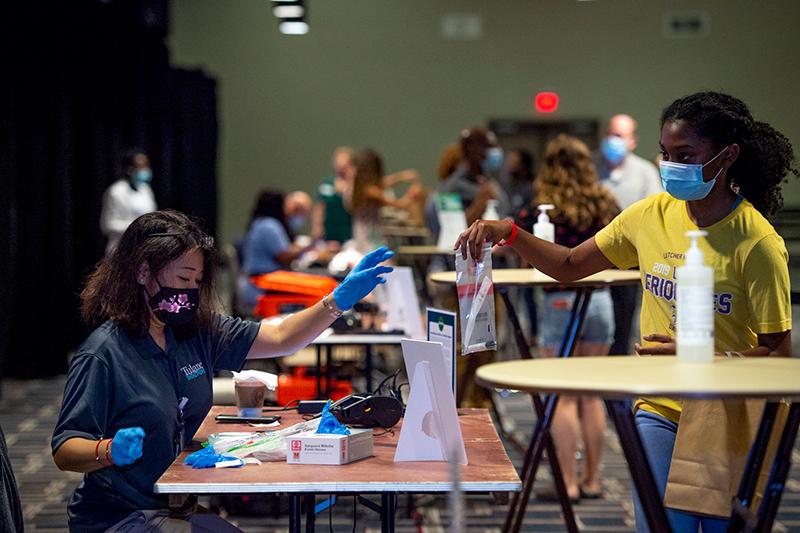COVID-19 testing will help protect campus and NOLA community
With COVID-19 testing of returning students, faculty and staff well underway, Campus Health officials say the benefits of identifying positive cases among Tulanians will help protect both the campus community and New Orleans as a whole.
“Enrolling a significant portion of the city’s population – including local students, faculty and staff who live here year-round – in a robust program of testing, tracing and quarantining helps everyone who calls NOLA home,” said Scott Tims, assistant vice president of Campus Health. “Identifying positives, especially among asymptomatic people who have no idea they are carrying the virus, and getting them to isolate until they are no longer contagious is key to lowering the overall infection rate.”
Before being allowed to move into their campus residences, students must receive a negative COVID-19 test at the Tulane Arrival Center, located in the Hyatt Regency in downtown New Orleans. Faculty, staff and off-campus students must also be tested at special centers located on the uptown and downtown campuses before returning to the classroom or office.
After classes begin on August 19, ongoing assessments will continue with testing of each individual at least once a month – which translates to daily testing of 5 percent of the Tulane community. Leading epidemiologists and other public health experts, who were central to crafting Tulane’s return to campus plan, believe this schedule, along with isolating/quarantining positive cases, contact tracing and health safety protocols, will be effective means of detecting cases and controlling outbreaks.
Beginning the first week of classes, Campus Health will begin reporting statistics from Tulane’s testing and tracing program to include positive cases, tests administered and the percentage of positive cases. These will be posted on the Return to Campus website. Updates will be posted weekly.
“Knowing and isolating those positives is just so important,” Tims said. “Testing, of course, does not cause an increase in the number of infections, but letting people know they are infected, especially those who asymptomatic, and helping them and those with whom they had close contact, isolate is vital to our university and city. This knowledge allows people to put into practice a “Not for one’s self, but for one’s own’ mindset on and off campus to effectively limit the spread of COVID-19.”
The welcoming of first-year students to the Arrival Center began this past weekend and will continue through Aug. 13, while returning students will be welcomed at the center Aug. 13-17. Upon arrival, students have their temperatures checked, are screened for any symptoms of illness and then directed to the Campus Health Processing Center for COVID-19 testing. Students also engage in two days of orientation sessions to support their return to campus. It is highly recommended that students stay at the Hyatt while they await their results. The hotel’s entire property is being used for the Arrival Center.
During the second day at the Arrival Center, students and parents attend information sessions designed to give them an understanding of what the fall semester will be like, said Erica Woodley, assistant vice president and dean of students.
“Parents and students will have the opportunity to hear from city officials and health experts about the public health behaviors necessary for a safe fall, as well as more specifically how Tulane is working to promote safety. There will also be sessions on Tulane values and behavioral expectations as well as what students can expect from the academic perspective,” Woodley said.
Campus Health nurses will speak with students to make sure they have completed their health requirements and will also conduct one-on-one education sessions on COVID-19 and campus life, according to Tims.
Faculty and staff must also complete training on safety protocols and best practices when on-campus and in the community. This is part of Tulane’s comprehensive public health strategy that also includes social distancing, mandatory face coverings for everyone on campus, including visitors, operational and infrastructure alterations such as deep cleaning and continual disinfection, plexiglass barriers, temporary classrooms and dining spaces, reconfigured class scheduling and much, much more.

